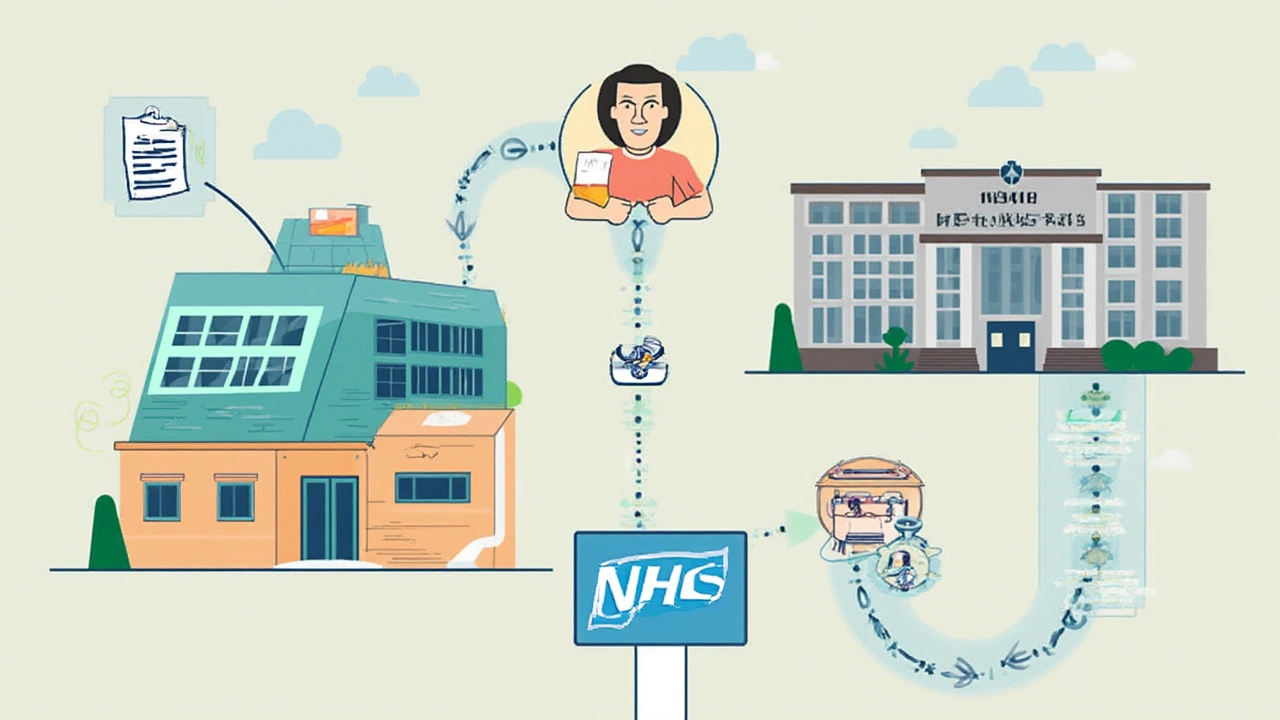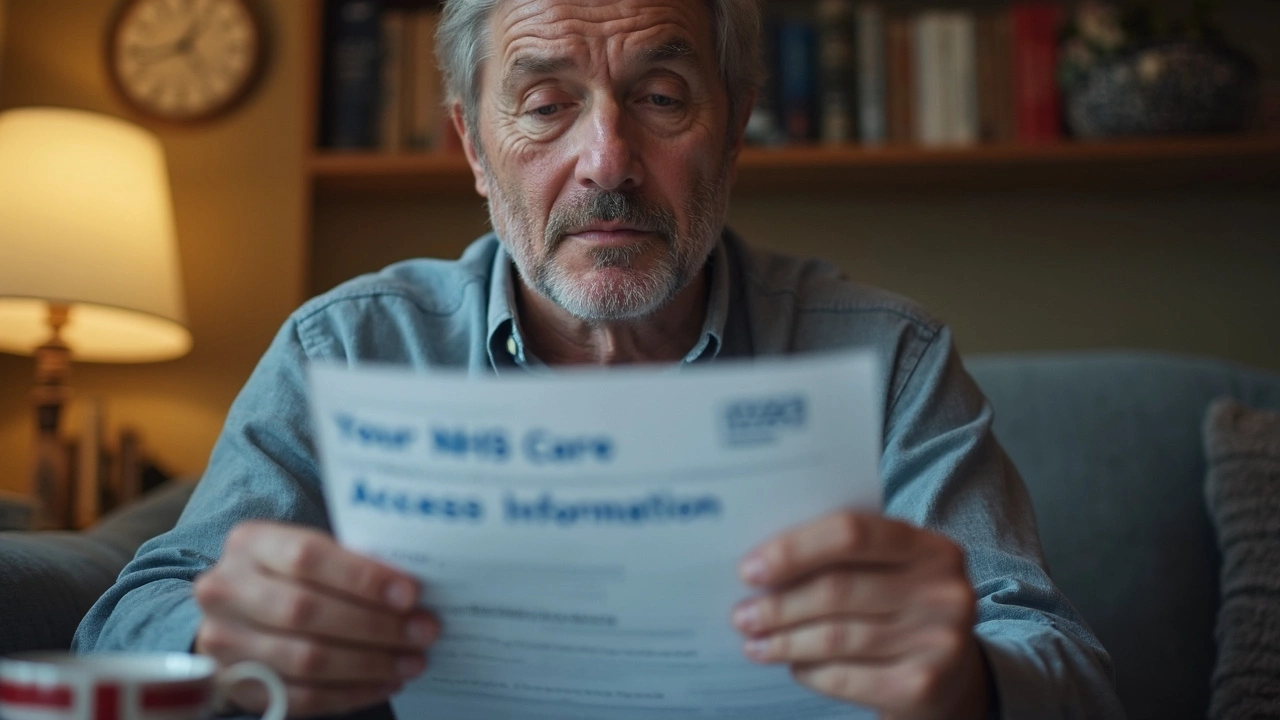 Jun, 28 2025
Jun, 28 2025
Straight up: plenty of folks in the UK wonder if going private for a surgery or checkup means they can't use the NHS again. Some think you get locked out or lose your spot on waiting lists. But is that actually true? In the real world, loads of people move between private healthcare and the NHS, either because their insurance ran out, the costs got out of hand, or the NHS simply felt like the right call next time. Still, no one seems to spell out the rules. A neighbour will insist you'll be stuck, the receptionist says "best talk to your GP," and the internet's full of horror stories and outdated forum posts. It gets confusing fast. And honestly, I've been there myself. My mate tried to convince me I'd be banned from the NHS forever after paying for a quick scan privately—spoiler, that's not how things work.
Understanding the NHS and Private Healthcare Divide
The UK health system is special because it gives everyone access to care, no matter their wallet. The NHS is free at the point of use. Private healthcare sits alongside, offering more choice and often faster access—if you, your insurer, or sometimes even work are happy to pay. Now, you might think these two worlds are totally separate, but actually, there’s a lot of overlap. Loads of consultants and surgeons work both NHS and private. You could see the same doctor in both settings! What often scares people is this idea that by using private care once, you’ll get cut from the NHS. Honestly, no official NHS rule bans you from returning. That’s a relief, right?
You might get private care for reasons like jumping a long NHS wait, choosing your surgeon, or wanting a private room. Some folks have private health insurance, sometimes supplied by their job. But for many, it's out-of-pocket. For a standard knee surgery, private bills often range from £7,000 to £15,000. For quick diagnostics, people can pay £300-£1,000. It's tempting to use private for speed, then switch back to the generously-funded NHS for follow-up, especially since the NHS picks up lifelong care, emergencies, and any trouble down the line.
Here’s the key thing: NHS care is always an option. If you use private for part of your treatment—like seeing a specialist or having a specific test—you keep the right to NHS services. Once your private episode ends, you can talk to your NHS GP again for ongoing care, new referrals, or anything else. People do it every day, sometimes even on the advice of their NHS doctors if a scan is needed urgently. There’s no blacklist, no penalty. The only exception? You can’t “mix” private and NHS in a single course of treatment for the same condition at the same time. That’s to stop people cherry-picking luxury extras on the NHS’s bill. But going back and forth, or swapping over between appointments, is fine.

Key Facts, Waiting Lists, and How Switching Really Works
Let’s talk waiting lists—because for a lot of people, this is the real reason they try private in the first place. As of spring 2025, there were about 7.5 million people on NHS elective waiting lists across England, the highest number in over a decade. Hip and knee operations, certain scans, and other non-urgent treatments are the most delayed. Private hospitals are running flat out too, with some seeing a 40% jump in self-funded patients since 2022. It’s no wonder folks look for shortcuts. But does going private mean you fall off those NHS lists for good?
The answer: not unless you actually cancel your NHS referral. Here’s a practical example. Say you need a hip operation. You sit on the NHS waiting list for months. You get fed up, find a private surgeon, and pay for the op. That’s your right. Once you’re sorted, your GP can update your NHS records. If you need further rehab, a physio review, or if complications hit, you just go back to your NHS GP. You’ll need to be re-referred for anything new, and you might face another NHS wait for treatments not linked to your private op. But no doors slam shut on you.
Now, if you have part of your treatment via private (let’s say a heart scan), the NHS accepts those results if they meet proper standards. There’s no “private scan means NHS can’t help you” rule. But if you started a course of therapy privately (let’s say physiotherapy) and then want to switch halfway through, the NHS may or may not restart or continue that therapy. That’s often a local decision based on your needs, capacity, and where you live. Anecdotally, some NHS providers are very flexible, especially for long-term rehab. Others politely say “You’ll need a new NHS referral, and then join the queue.” The truth is, your GP and specialists have seen this switching before, so just ask them outright what will happen next. Honestly, having copies of any private medical letters or scans makes your NHS transfer much smoother.
Curious about the costs and wait differences? Here’s a quick snapshot:
| Treatment Type | Average NHS Wait (as of June 2025) | Average Private Wait | Average Private Cost |
|---|---|---|---|
| Knee Replacement | 6-12 months | 2-4 weeks | £10,000 |
| Hip Replacement | 5-10 months | 2-3 weeks | £12,000 |
| MRI Scan | 2-4 months | 1-2 days | £350 |
| Consultant Appointment | 1-3 months | 1-7 days | £250 |
One thing many people get wrong: you don’t have to tell your GP you “went private,” but it usually helps. Your records stay up to date, your care is safer, and you don't accidentally repeat tests or miss follow-up. I know someone who forgot to mention an expensive private scan. When he finally told his NHS doctor, they were actually relieved—they could use those results instead of making him wait three more months.
If you were on an NHS waiting list but pay for private care instead, actually tell your NHS hospital so they can remove you and give your slot to someone else. If your private treatment fails or something else comes up later, you simply start again with your GP and referral. This isn’t ideal—moving up the queue twice isn’t allowed. But you aren’t “banned.” It’s a fair way to balance the system, and there’s no judgement for those who move between both worlds. People are doing it in every postcode.

Tips and Key Takeaways for a Smooth Switch
If you’ve already gone private and need to rejoin the NHS, or you’re thinking about your options, these practical steps make life much smoother:
- Keep your paperwork: Keep discharge summaries, scans, and letters from private care. These help NHS doctors pick up where things left off.
- Talk to your GP: They’re your route back into the NHS—don’t be shy about your history. If you had a procedure elsewhere, they're used to seeing this.
- Be clear about NHS rules: You can move between private and NHS, but can’t have both for the same thing at the same time. Ask if you need a fresh referral back onto an NHS list.
- Mental health counts too: The same rules apply for psychological support, therapy, and counseling. If you start privately, you can still return to NHS services for new support, but you’ll usually have to join the standard queues again.
- Insurance and hybrid care: If you have private health insurance, many policies include “NHS top-up” features, like paying for a private room if you’re treated in NHS hospital. Check your paperwork or talk to your provider.
- If something goes wrong: The NHS never abandons people who face emergencies or serious complications—even if a procedure was done privately. You’ll get urgent care the same as everyone else.
You might be surprised at how common switching is. About 10-15% of all elective procedures in 2024 involved people moving between private and NHS care at some point. Especially after Covid backlogs, GPs and specialists have dealt with this situation again and again. Private blood tests, private x-rays, even one-off second opinions—they’re all compatible with later NHS care. The key thing is communication. Your new NHS team need to know what’s happened, and what’s already been checked out, so their time—and yours—isn’t wasted.
One practical story: Sophia had a scan done privately after waiting months for the NHS. Once she switched back, she handed the paperwork to the GP and that was that—it went in her record, her NHS journey resumed, and the consultant was glad the system worked for her. She’s hardly alone. Most people don’t hit any friction at all. If you do meet a problem, it’s worth politely challenging it—NHS England’s own website is clear that “patients retain the right to NHS care even after private treatment.”
So, bottom line: yes, you can go back to the NHS after going private. There’s no ban, no blacklist, no shame. The biggest catch is you can’t have both types for the exact same bit of treatment at the same exact time, and if you switch mid-treatment, you might need to start over on NHS lists. But going private doesn’t close any public doors for you, and the whole process is more flexible than most people think. Just keep your records, talk openly to your GP, and don’t let urban legends about the NHS stop you from getting the care you need.
